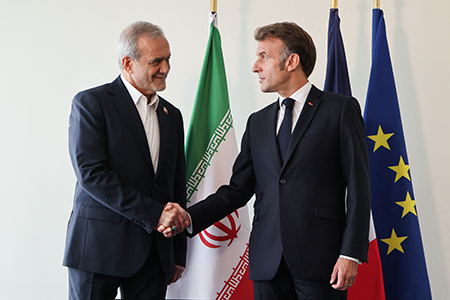Iran to Suspend IAEA Deal After UN Sanctions Return
October 2025
By Kelsey Davenport
Iran said it would suspend cooperation with the International Atomic Energy Agency (IAEA) after the UN Security Council reimposed sanctions and restrictions on Tehran’s nuclear and missile programs. But details were unclear.

Iranian President Masoud Pezeshkian told reporters Sept. 26 that the reimposition of sanctions was “unfair, unjust, and illegal.” After the measures were reimposed, he said in a Sept. 29 speech that Iran will not “bow down” to sanctions pressure.
The Security Council decision came a decade after a landmark international agreement called the Joint Comprehensive Plan of Action (JCPOA) imposed tight controls on Iran’s nuclear programs in return for a lifting of sanctions. In 2018, U.S. President Donald Trump unilaterally abandoned the agreement. Iran initially complied with its commitments but eventually resumed prohibited activities. In addition to the United States, other parties to the deal were China, Russia, France, Germany and the United Kingdom.
During the Sept. 26 press conference, Pezeshkian said that Iran will not leave the nuclear Nonproliferation Treaty (NPT) in response to the reimposition. But Iran said it would suspend a Sept. 9 arrangement that Foreign Minister Abbas Araghchi reached with the IAEA to restart cooperation, after Iran suspended safeguards following the Israeli and U.S. strikes on its nuclear facilities in June. Iran is legally required to implement a safeguards agreement as an NPT member.
The reimposition of UN Security Council resolutions on Iran from 2006 to 2010 took effect Sept. 28 as expected, 30 days after a request from France, Germany, and the United Kingdom—known as the E3—to restore the measures. They cited Iran’s violations of the 2015 nuclear deal as the reason for reimposition. (See ACT, September 2025.)
U.S. Secretary of State Marco Rubio said in a Sept. 27 statement that the reimposition of sanctions sends “a clear message” that Iran will be “held to account.” He said that “diplomacy is still an option” but “Iran must accept direct talks.”
In addition to sanctions, the Security Council resolutions restore prohibitions on Iranian nuclear activities—including uranium enrichment and missile development—that were lifted by Security Council Resolution 2231, which endorsed the JCPOA.
The three European countries were able to reimpose the previous resolutions using a unique mechanism contained in Resolution 2231, known as “snapback,” that cannot be blocked.
In a Sept. 19 Security Council vote to extend the JCPOA, only Algeria, China, Pakistan, and Russia voted in favor of the measure. The Security Council needed to pass that resolution to prevent the reimposition of the previous resolutions.
The E3 said in a Sept. 28 statement that they “made every effort” to avoid snapback and that “Iran did not engage seriously” with their offer to extend snapback in exchange for Iran’s commitment to resume talks with the United States, meet its IAEA safeguards obligations, and address its highly enriched uranium stockpiles. The E3 urged all states to implement the reimposed sanctions.
In a Sept. 26 press briefing, Araghchi said Iran showed “good faith by presenting good and doable proposals which could have resolved this problem,” but Iran’s “diplomacy has been blocked.” He suggested that Iran and France made progress on a framework that could have extended snapback, but France was “unable to secure the approval of the United States.”
Araghchi did not present specifics on Iran’s proposal, but he referenced an agreement he signed with IAEA Director-General Rafael Mariano Grossi in Cairo Sept. 9 as a sign of Tehran’s willingness to engage. The text of the Cairo agreement was not made public, and Araghchi and Grossi offered slightly different descriptions of what it contained.
Araghchi told Iranian state TV Sept. 10 that “the nature of [IAEA] access will have to be discussed at an appropriate time” and will be “based on reports that Iran will issue.”
Grossi said the Cairo agreement provided a “clear understanding of the procedures for inspections.” He said it was “fully in line with the relevant provisions” of Iran’s comprehensive safeguards agreement.
The Europeans suggested the agreement was insufficient because it did not include specific timelines for accessing nuclear sites in Iran that were attacked by Israel and the United States. The IAEA has had access to Iran’s Bushehr nuclear power reactor and the Tehran Research Reactor, neither of which were targeted by U.S. and Israeli strikes.
The Europeans also sought information on the status of Iran’s stockpile of uranium-235 enriched to 60 percent. According to a Sept. 3 IAEA report, Iran had 441 kilograms of uranium enriched to that level before the June 13 strikes. Iran likely moved the material to the underground facility at Esfahan that was too deeply buried to be destroyed by U.S. strikes. The entrance to that facility was struck, however, rendering the material inaccessible. (See ACT, July/August 2025.)
Araghchi told the state-run IRIB News Agency in a Sept. 11 interview that the Atomic Energy Organization of Iran is evaluating “whether these materials are accessible or not, and the status of some of them.”
Pezeshkian said Iran was willing to talk to the E3 and the United States at the United Nations, but U.S. officials did not show up for the meeting. He suggested that Iran had reached “understandings” with the Europeans, but the United States rejected the progress.
U.S. Special Envoy Steve Witkoff told reporters Sept. 24 that “we’re talking to [Iran]” but did not specify if he had met with Iranian officials. U.S. Energy Secretary Chris Wright told the IAEA Sept. 15 that the United States is still interested in reaching an agreement with Iran, but “Iran’s nuclear weapons pathway, including all enrichment and reprocessing capabilities, must be completely dismantled.”
Although the United States and Israel struck Iran’s two uranium enrichment facilities, a report from Le Monde suggested that Israeli intelligence assessed that Iran retains the capabilities to restart uranium enrichment. Iran says it will not agree to give up uranium enrichment as part of any deal.
